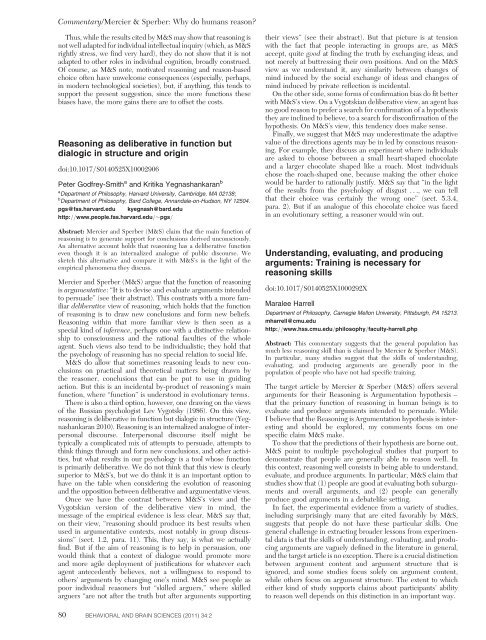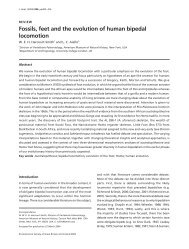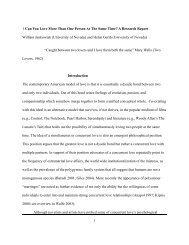Commentary/Mercier & Sperber: <strong>Why</strong> <strong>do</strong> <strong>hum<strong>an</strong>s</strong> <strong>reason</strong>?Thus, while the results cited by M&S may show that <strong>reason</strong>ing isnot well adapted <strong>for</strong> individual intellectual inquiry (which, as M&Srightly stress, we find very hard), they <strong>do</strong> not show that it is notadapted to other roles in individual cognition, broadly construed.Of course, as M&S note, motivated <strong>reason</strong>ing <strong>an</strong>d <strong>reason</strong>-basedchoice often have unwelcome consequences (especially, perhaps,in modern technological societies), but, if <strong>an</strong>ything, this tends tosupport the present suggestion, since the more functions thesebiases have, the more gains there are to offset the costs.Reasoning as deliberative in function butdialogic in structure <strong>an</strong>d origin<strong>do</strong>i:10.1017/S0140525X10002906Peter Godfrey-Smith a <strong>an</strong>d Kritika Yegnash<strong>an</strong>kar<strong>an</strong> ba Department of Philosophy, Harvard University, Cambridge, MA 02138;b Department of Philosophy, Bard College, Ann<strong>an</strong>dale-on-Hudson, NY 12504.pgs@fas.harvard.edu kyegnash@bard.eduhttp://www.people.fas.harvard.edu/≏pgs/Abstract: Mercier <strong>an</strong>d Sperber (M&S) claim that the main function of<strong>reason</strong>ing is to generate support <strong>for</strong> conclusions derived unconsciously.An alternative account holds that <strong>reason</strong>ing has a deliberative functioneven though it is <strong>an</strong> internalized <strong>an</strong>alogue of public discourse. Wesketch this alternative <strong>an</strong>d compare it with M&S’s in the light of theempirical phenomena they discuss.Mercier <strong>an</strong>d Sperber (M&S) argue that the function of <strong>reason</strong>ingis <strong>argumentative</strong>: “It is to devise <strong>an</strong>d evaluate arguments intendedto persuade” (see their abstract). This contrasts with a more familiardeliberative view of <strong>reason</strong>ing, which holds that the functionof <strong>reason</strong>ing is to draw new conclusions <strong>an</strong>d <strong>for</strong>m new beliefs.Reasoning within that more familiar view is then seen as aspecial kind of inference, perhaps one with a distinctive relationshipto consciousness <strong>an</strong>d the rational faculties of the wholeagent. Such views also tend to be individualistic; they hold thatthe psychology of <strong>reason</strong>ing has no special relation to social life.M&S <strong>do</strong> allow that sometimes <strong>reason</strong>ing leads to new conclusionson practical <strong>an</strong>d theoretical matters being drawn bythe <strong>reason</strong>er, conclusions that c<strong>an</strong> be put to use in guidingaction. But this is <strong>an</strong> incidental by-product of <strong>reason</strong>ing’s mainfunction, where “function” is understood in evolutionary terms.There is also a third option, however, one drawing on the viewsof the Russi<strong>an</strong> psychologist Lev Vygotsky (1986). On this view,<strong>reason</strong>ing is deliberative in function but dialogic in structure (Yegnash<strong>an</strong>kar<strong>an</strong>2010). Reasoning is <strong>an</strong> internalized <strong>an</strong>alogue of interpersonaldiscourse. Interpersonal discourse itself might betypically a complicated mix of attempts to persuade, attempts tothink things through <strong>an</strong>d <strong>for</strong>m new conclusions, <strong>an</strong>d other activities,but what results in our psychology is a tool whose functionis primarily deliberative. We <strong>do</strong> not think that this view is clearlysuperior to M&S’s, but we <strong>do</strong> think it is <strong>an</strong> import<strong>an</strong>t option tohave on the table when considering the evolution of <strong>reason</strong>ing<strong>an</strong>d the opposition between deliberative <strong>an</strong>d <strong>argumentative</strong> views.Once we have the contrast between M&S’s view <strong>an</strong>d theVygotski<strong>an</strong> version of the deliberative view in mind, themessage of the empirical evidence is less clear. M&S say that,on their view, “<strong>reason</strong>ing should produce its best results whenused in <strong>argumentative</strong> contexts, most notably in group discussions”(sect. 1.2, para. 11). This, they say, is what we actuallyfind. But if the aim of <strong>reason</strong>ing is to help in persuasion, onewould think that a context of dialogue would promote more<strong>an</strong>d more agile deployment of justifications <strong>for</strong> whatever eachagent <strong>an</strong>tecedently believes, not a willingness to respond toothers’ arguments by ch<strong>an</strong>ging one’s mind. M&S see people aspoor individual <strong>reason</strong>ers but “skilled arguers,” where skilledarguers “are not after the truth but after arguments supportingtheir views” (see their abstract). But that picture is at tensionwith the fact that people interacting in groups are, as M&Saccept, quite good at finding the truth by exch<strong>an</strong>ging ideas, <strong>an</strong>dnot merely at buttressing their own positions. And on the M&Sview as we underst<strong>an</strong>d it, <strong>an</strong>y similarity between ch<strong>an</strong>ges ofmind induced by the social exch<strong>an</strong>ge of ideas <strong>an</strong>d ch<strong>an</strong>ges ofmind induced by private reflection is incidental.On the other side, some <strong>for</strong>ms of confirmation bias <strong>do</strong> fit betterwith M&S’s view. On a Vygotski<strong>an</strong> deliberative view, <strong>an</strong> agent hasno good <strong>reason</strong> to prefer a search <strong>for</strong> confirmation of a hypothesisthey are inclined to believe, to a search <strong>for</strong> disconfirmation of thehypothesis. On M&S’s view, this tendency <strong>do</strong>es make sense.Finally, we suggest that M&S may underestimate the adaptivevalue of the directions agents may be in led by conscious <strong>reason</strong>ing.For example, they discuss <strong>an</strong> experiment where individualsare asked to choose between a small heart-shaped chocolate<strong>an</strong>d a larger chocolate shaped like a roach. Most individualschose the roach-shaped one, because making the other choicewould be harder to rationally justify. M&S say that “in the lightof the results from the psychology of disgust ..., we c<strong>an</strong> tellthat their choice was certainly the wrong one” (sect. 5.3.4,para. 2). But if <strong>an</strong> <strong>an</strong>alogue of this chocolate choice was facedin <strong>an</strong> evolutionary setting, a <strong>reason</strong>er would win out.Underst<strong>an</strong>ding, evaluating, <strong>an</strong>d producingarguments: Training is necessary <strong>for</strong><strong>reason</strong>ing skills<strong>do</strong>i:10.1017/S0140525X1000292XMaralee HarrellDepartment of Philosophy, Carnegie Mellon University, Pittsburgh, PA 15213.mharrell@cmu.eduhttp://www.hss.cmu.edu/philosophy/faculty-harrell.phpAbstract: This commentary suggests that the general population hasmuch less <strong>reason</strong>ing skill th<strong>an</strong> is claimed by Mercier & Sperber (M&S).In particular, m<strong>an</strong>y studies suggest that the skills of underst<strong>an</strong>ding,evaluating, <strong>an</strong>d producing arguments are generally poor in thepopulation of people who have not had specific training.The target article by Mercier & Sperber (M&S) offers severalarguments <strong>for</strong> their Reasoning is Argumentation hypothesis –that the primary function of <strong>reason</strong>ing in hum<strong>an</strong> beings is toevaluate <strong>an</strong>d produce arguments intended to persuade. WhileI believe that the Reasoning is Argumentation hypothesis is interesting<strong>an</strong>d should be explored, my comments focus on onespecific claim M&S make.To show that the predictions of their hypothesis are borne out,M&S point to multiple psychological studies that purport todemonstrate that people are generally able to <strong>reason</strong> well. Inthis context, <strong>reason</strong>ing well consists in being able to underst<strong>an</strong>d,evaluate, <strong>an</strong>d produce arguments. In particular, M&S claim thatstudies show that (1) people are good at evaluating both subarguments<strong>an</strong>d overall arguments, <strong>an</strong>d (2) people c<strong>an</strong> generallyproduce good arguments in a debatelike setting.In fact, the experimental evidence from a variety of studies,including surprisingly m<strong>an</strong>y that are cited favorably by M&S,suggests that people <strong>do</strong> not have these particular skills. Onegeneral challenge in extracting broader lessons from experimentaldata is that the skills of underst<strong>an</strong>ding, evaluating, <strong>an</strong>d producingarguments are vaguely defined in the literature in general,<strong>an</strong>d the target article is no exception. There is a crucial distinctionbetween argument content <strong>an</strong>d argument structure that isignored, <strong>an</strong>d some studies focus solely on argument content,while others focus on argument structure. The extent to whicheither kind of study supports claims about particip<strong>an</strong>ts’ abilityto <strong>reason</strong> well depends on this distinction in <strong>an</strong> import<strong>an</strong>t way.80 BEHAVIORAL AND BRAIN SCIENCES (2011) 34:2
Commentary/Mercier & Sperber: <strong>Why</strong> <strong>do</strong> <strong>hum<strong>an</strong>s</strong> <strong>reason</strong>?The definition of <strong>an</strong> argument given by M&S is st<strong>an</strong>dard: A setof statements, one of which is the conclusion, which is supposed tobe epistemically supported by the other statements, called the premises.The content of <strong>an</strong> argument refers to the propositions thatare expressed by the premises <strong>an</strong>d conclusion, whereas the structureof the argument refers to the way the premises work togetherto support the conclusion. Successfully underst<strong>an</strong>ding <strong>an</strong> argumentconsists in being able to identify both the content <strong>an</strong>d thestructure of the argument: the conclusion, the premises, <strong>an</strong>d theparticular way the premises support the conclusion (e.g.,whether the premises are linked or convergent). Successfully evaluating<strong>an</strong> argument consists in being able to assess the content(i.e., determine whether the premises are true) <strong>an</strong>d the structure(i.e., determine whether, assuming that they are true, the premisesactually <strong>do</strong> support the conclusion). Finally, successfully constructing<strong>an</strong> argument consists in being able to supply true premises<strong>an</strong>d specify how those premises work together to supportthe conclusion. Although structure <strong>an</strong>d content are both relev<strong>an</strong>t<strong>for</strong> all three activities, they are relev<strong>an</strong>t in different ways, <strong>an</strong>d sogreat care is required (but not always taken) in designing experimentaltasks that appropriately test them.Problematic empirical evidence arises <strong>for</strong> all three: argumentunderst<strong>an</strong>ding, argument evaluation, <strong>an</strong>d argument production.For the first process, there actually seems to be sc<strong>an</strong>t researchin the area of argument underst<strong>an</strong>ding. The little research that<strong>do</strong>es exist in this area is mixed. Some studies (e.g., Ricco 2003,cited by M&S) suggest that <strong>for</strong> simple arguments, adults c<strong>an</strong>,when prompted, differentiate between linked <strong>an</strong>d convergentarguments. Other studies, however, suggest that, even <strong>for</strong>simple arguments, untrained college students c<strong>an</strong> identify theconclusion but without prompting are poor at both identifyingthe premises <strong>an</strong>d how the premises support the conclusion(Harrell 2006; 2008; <strong>for</strong>thcoming).Second, argument evaluation is usually loosely, <strong>an</strong>d onlyimplicitly, defined as being able either to identify <strong>reason</strong>ing fallaciesor to differentiate <strong>reason</strong>able arguments from un<strong>reason</strong>ableones. The research on argument evaluation seems mixed, at best.In particular, a number of systematic biases have been found.When witnessing <strong>an</strong> argument from the outside, particip<strong>an</strong>ts’ judgmentof the burden of proof depends on who speaks first (Bailenson& Rips 1996, cited by M&S), <strong>an</strong>d particip<strong>an</strong>ts routinely mistakeinnocuous repetition <strong>for</strong> circularity (Rips 2002, cited by M&S).When participating in <strong>an</strong> argument themselves, particip<strong>an</strong>ts tendto <strong>reason</strong> less well th<strong>an</strong> when witnessing <strong>an</strong> argument (Neum<strong>an</strong>et al. 2006; Thompson et al. 2005b; both cited by M&S).Finally, in m<strong>an</strong>y of these studies, the perception by theresearchers that particip<strong>an</strong>ts were able to “build complex arguments”(sect. 2.2, para. 3) is vague or ambiguous. Producing <strong>an</strong>argument is import<strong>an</strong>tly different from, <strong>for</strong> example, mere factgathering, but the research focuses almost exclusively on nothingmore complex th<strong>an</strong> the listing of <strong>reason</strong>s to believe. Even <strong>for</strong>this simple kind of argument production, studies suggest thatboth low- <strong>an</strong>d high-cognitive-ability particip<strong>an</strong>ts have difficultyproducing evidence <strong>for</strong> a claim (Sá et al. 2005, cited by M&S).Contrary to the claims by M&S, a wide literature supports thecontention that the particular skills of underst<strong>an</strong>ding, evaluating,<strong>an</strong>d producing arguments are generally poor in the population ofpeople who have not had specific training <strong>an</strong>d that specific trainingis what improves these skills. Some studies, <strong>for</strong> example, showthat students per<strong>for</strong>m signific<strong>an</strong>tly better on <strong>reason</strong>ing tasks onlywhen they have learned to identify premises <strong>an</strong>d conclusions(Shaw 1996, cited by M&S) or have learned some st<strong>an</strong>dard argumentationnorms (Weinstock et al. 2004, cited by M&S). M&Smay be correct that some of these negative results arisebecause the stakes are too low, but m<strong>an</strong>y studies that showimprovements from specific training occur in high-stakesenvironments like a college course (Harrell, <strong>for</strong>thcoming;Twardy 2004; v<strong>an</strong> Gelder 2005; v<strong>an</strong> Gelder et al. 2004). Thissuggests that difficulty with underst<strong>an</strong>ding, evaluating, <strong>an</strong>d producingarguments may be a deeper feature of our cognition.The <strong>argumentative</strong> <strong>theory</strong> of <strong>reason</strong>ing appliesto scientists <strong>an</strong>d philosophers, too<strong>do</strong>i:10.1017/S0140525X10002931John A. JohnsonDepartment of Psychology, Pennsylv<strong>an</strong>ia State University, DuBois, PA 15801.j5j@psu.eduhttp://www.personal.psu.edu/≏j5j/Abstract: Logical consistency dem<strong>an</strong>ds that Mercier <strong>an</strong>d Sperber’s(M&S’s) <strong>argumentative</strong> <strong>theory</strong> of <strong>reason</strong>ing apply to their own<strong>reason</strong>ing in the target article. Although they hint that their argumentapplies to professional <strong>reason</strong>ers such as scientists <strong>an</strong>d philosophers,they <strong>do</strong> not develop this idea. In this commentary, I discuss theapplicability of <strong>argumentative</strong> <strong>theory</strong> to science <strong>an</strong>d philosophy,emphasizing the perils of moral <strong>reason</strong>ing.Mercier <strong>an</strong>d Sperber (M&S) argue that the primary evolvedfunction of <strong>reason</strong>ing is persuasive argumentation. If theprimary function of <strong>an</strong>y evolved trait – including <strong>reason</strong>ingability – is the same <strong>for</strong> all members of a species, then itfollows that professional <strong>reason</strong>ers (including scientists <strong>an</strong>d philosophers)are primarily in the business of persuasive argumentation.Furthermore, if M&S’s dual-process model of <strong>reason</strong>ing isaccurate, professional <strong>reason</strong>ers initially arrive at their conclusionsby intuitive leaps <strong>an</strong>d only later construct logical argumentsto convince others of these conclusions. The notion thatscientists <strong>an</strong>d philosophers are more concerned with persuadingothers that something is true th<strong>an</strong> with discovering truth contradictsthe image of scientists <strong>an</strong>d philosophers as dispassionatetruth-seekers. This response to M&S’s target article aims todevelop this subversive implication of their argument.That M&S’s <strong>argumentative</strong> <strong>theory</strong> applies to their own <strong>reason</strong>ingis necessary if their <strong>theory</strong> is to be consistent. To suggestotherwise is to commit what Little (1972) called the nonreflexivefallacy. Yet M&S spend virtually the entire article discussingstudies of nonscientists <strong>an</strong>d nonphilosophers, with just the briefestmention of how their <strong>theory</strong> might apply to professional <strong>reason</strong>ers.One exception is a reference to reviewers of scientificm<strong>an</strong>uscripts who look <strong>for</strong> flaws in papers to justify rejectionwhen they <strong>do</strong> not agree with a paper’s conclusion. They alsoremark near the end of their article that even among scientiststhe ability to control one’s own biases is “uncommon” <strong>an</strong>d“almost freakish” (sect. 6, para. 7).Perhaps the dearth of examples of professional-<strong>reason</strong>ing-quaargumentationis due to space limitations. Or, perhaps there islittle empirical research on this topic. Or, perhaps other professional<strong>reason</strong>ers will not find the <strong>theory</strong> as congenial as M&Ssuggest in their concluding sentence. After all, it could be somewhatdeme<strong>an</strong>ing to see one’s professional activity (<strong>reason</strong>ing) asequivalent to ordinary squabbling over whether my favoritesports team is better th<strong>an</strong> your favorite sports team. WhereasLittle (1972) aims to elevate ordinary people to the status of scientists,M&S appear to be challenging the status of scientists <strong>an</strong>d philosophersas elite thinkers. To suggest that “[s]killed arguers,however, are not after the truth but after arguments supportingtheir views” (see the M&S abstract) is to challenge the idea thatscientists <strong>an</strong>d philosophers are motivated in <strong>an</strong> unbiased way bypure curiosity about what is true.I believe that we professional <strong>reason</strong>ers should accept M&S’shumbling view of our activities because it is <strong>an</strong> accurate descriptionof reality. Yes, we are interested in truth, but we relish thethought of convincing others that we have discovered import<strong>an</strong>ttruths. I must confess that the M&S thesis was immediately congenialto me because it affirms my own long-held beliefs abouthow professional <strong>reason</strong>ers such as scientists <strong>an</strong>d moral philosophersgo about their work (Johnson et al. 1988). Observations ofthe actual behavior of scientific researchers indicate that textbookdescriptions of science are highly inaccurate. Scientists <strong>do</strong> notbegin with a thorough set of dispassionate observations aboutBEHAVIORAL AND BRAIN SCIENCES (2011) 34:2 81




